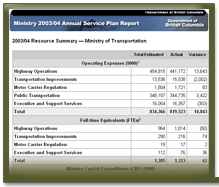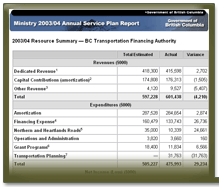 |
|
Report on Resources
Complete BC Transportation Financing Authority Financial Statements are available in Appendix 2. Major Capital ProjectsNisga'a HighwayObjective: The Nisga'a Highway Project has entered the sixth year of a seven-year investment program that involves upgrading the Nisga'a Highway from a gravel resource road to an all-weather, two-lane highway that meets a 70 kilometres per hour standard. The upgrade is now 70 per cent paved and complete, and the remaining segments are easy to construct in comparison to the completed work. The upgrade will better serve Nass Valley residents and resource industries in the area. Costs: The estimated total cost for the seven-year program is $52 million. Expenditures to March 31, 2004, are $36.8 million. Benefits:
Risks: This project has presented engineering and construction challenges due to the rugged terrain. However, few risks remain as the construction left on the Nisga'a Highway upgrade is straightforward gravel and paving work. Kicking Horse CanyonObjective: Upgrade the 26-kilometre section of the Trans-Canada Highway to a modern four-lane standard from the junction of Highway 95 at Golden to the western boundary of Yoho National Park. This mostly two-lane corridor, originally constructed throughout the 1950s, is an important route for tourism, resource development and inter-provincial trade. The upgrade will result in a major service improvement to the Trans-Canada Highway, support the safe and efficient movement of goods and services and augment the capacity of a critical provincial/national gateway. Costs and project status: The estimated cost is $195 million for the first two phases.
Note: The ministry anticipates there will be a third phase for upgrades in the future from Golden to 5-Mile and 10-Mile to Yoho National Park when federal cost-sharing is secured. Benefits:
Risks:
Okanagan Lake BridgeObjectives: To construct a new crossing to replace the 45-year old Okanagan Lake Bridge now at the end of its economic and service life, to enhance safety, and to reduce congestion in peak hours and through the summer. Costs: The ministry is seeking a public-private partnership (P3) for a concessionaire to design, build, finance and operate a new crossing. The ministry estimates total capital costs to be in the order of $100 million. These costs will be assumed by the concessionaire, in return for annual performance payments from the Province based on key services provided such as availability, safety performance and traffic volumes. In addition, approximately $20 million of improvements will be constructed on the west approaches of the new crossing. Project expenditures to March 31, 2004, are $3.7 million. Benefits:
Risks: Engineering challenges associated with floating structures. However, the risks associated with the design and construction of this new crossing will be assumed by the concessionaire. Sea-to-Sky Highway Improvement ProjectObjectives: The current predominantly two-lane highway has safety, reliability, mobility and maintenance problems and is facing growing congestion. Extensive improvements to the highway are required between Horseshoe Bay and Whistler to improve safety, reliability and mobility; making travel along the corridor safer for residents, commuters, tourists and businesses moving goods. Costs: The ministry is conducting a competition to select a qualified team to design, build, finance, operate and maintain improvements to the Sea-to-Sky Highway. A Request for Proposals is scheduled to be issued to short-listed proponents in September 2004 and a qualified team will be selected by the end of 2004. The estimated project cost is $600 million and expenditures to March 31, 2004 are on budget at $22 million. Project Benefits:
Project Risks: The project is complex and challenging because of:
|
|||||||||||||||||||||||||||||||||||||||||||
|
||||||||||||||||||||||||||||||||||||||||||||


